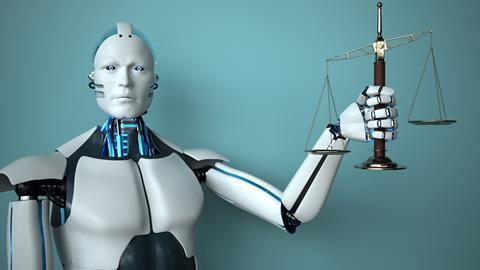Famed legal commentator Professor Richard Susskind recently began a Times article with a dire forecast: ‘If the leaders of most artificial intelligence companies are right about the speed of technological advance, there will be little work left for traditional lawyers by 2035.’

Susskind suggested that machines would take over from lawyers in his 2008 book The End of Lawyers? Nearly 17 years later, there are more lawyers than ever.
The recent surge in AI development has sparked concerns about the future of many professions, law included. Some, like Susskind, predict that machine intelligence will massively displace lawyers. However, there are compelling reasons to believe that the future for lawyers remains bright, albeit different. If anything, AI will create new opportunities rather than wipe lawyers out.
Technology creates complexity
Every technological advance has legal consequences. Far from reducing legal work, technology often creates more of it. Take email, for example. It revolutionised communication, but it also expanded the scope of legal discovery exponentially. Pre-email, discovery was largely limited to letters and memos. Today, lawyers can be tasked with reviewing thousands, sometimes millions, of emails in a single matter. AI, too, will make the world a more complex place, and lawyers thrive on complexity.
Privacy law was not really a thing 10 years ago, but the rise of technology has made privacy a major legal issue. Many lawyers now do privacy work. The same with cybersecurity. So it will be with AI.
Capability does not equal adoption
The mere capability of a technology does not guarantee its adoption. Historically, there is often a long lag between invention and widespread use. Many factors – including cost, complexity, and resistance to change – slow down the uptake of even the most promising innovations. The law is no exception. Tech deployments are expensive and often difficult, regulatory issues are thorny, and entrenched practices die hard. AI will certainly reshape legal work, but it will not do so quickly.
Meeting unmet legal demand
There is vast, unmet demand for legal services. Traditional legal advice remains too expensive for many individuals and small businesses. AI will allow lawyers to offer services at a much lower cost, unlocking this under-served market. This phenomenon is explained by the economic theory known as the Jevons paradox. The paradox is that as technology improves efficiency and reduces cost, overall demand often increases rather than staying constant. Think of your phone: the cost per megabyte of data has dropped dramatically in recent years, but your phone bills have not. Instead, we find more things to do with our phones – streaming, scrolling, downloading – and end up using more data. The same dynamic applies to legal services. As AI makes legal advice cheaper and more accessible, more people will seek it out.
The company I co-founded, Lawpath, demonstrates this potential. Lawpath has served more than 500,000 clients – many of whom would likely have gone without any legal assistance if faced with traditional law firm fees. Rather than eroding legal work, AI can expand the market, allowing lawyers to meet previously unmet legal needs.
More disputes, not fewer
AI is also likely to fuel a significant rise in the number of disputes. Recently, the US Treasury issued a new crypto rule and expected around 200 public submissions in response. However, a group of crypto advocates created an AI app that allowed users to generate submissions at scale, and the agency received over 120,000 submissions, which they had to review.
Likewise, many companies are reporting a spike in complex customer complaints, thanks to AI tools such as ChatGPT making it easier for consumers to lodge grievances. The Harvard Business Review recently reported that ‘making a complaint’ ranked number 23 out of the top 100 uses for GenAI. And as the Gazette reported earlier this month, regulators have just approved a new AI-powered law firm, Garfield AI, that will do letters of demand for £2.
All of those grievances need to be reviewed and settled – more work for lawyers on the receiving end.
We are seeing much investment in technology to empower the plaintiff bar – those firms that bring mass tort cases. For example, AI platform Eve recently raised $47m to ‘help plaintiff law firms punch above their weight’. Last month, AI-powered legal analysis platform Supio raised $60m to help personal injury and mass tort firms review medical bills and deal with all aspects of these cases.
The most innovative of the developments in the mass tort space is ClaimClam. Just enter your details, and it will show you which class actions you are eligible to join.
AI democratises the legal process, and the judiciary is preparing itself for a barrage of self-represented litigants. A New York State Supreme Court judge recently admonished a self-represented litigant for using an AI-generated avatar to plead his case for him.
AI will likely make the world a more contentious place – and where there is conflict, there is demand for lawyers.
Human nature still favours lawyers
Human nature plays a crucial role in preserving the need for lawyers in three important ways.
People want to win
People could resolve disputes or complete deals earlier, but often choose not to. Even when the facts and the law are clear, human psychology comes into play. People want just that little bit more; to feel they have won. If parties cannot agree, it does not matter what a machine says: lawyers are needed to bridge the gap and broker a settlement.
People level up, not give up
People do not surrender to technology; they level up. Geoffrey Hinton, the Nobel prize-winning ‘godfather of AI’, famously predicted in 2016 that AI would render radiologists obsolete within five years. Yet the number of radiologists in the US has actually grown by 1.4% annually since then, and there is a global shortage of radiologists. Rather than abandoning their careers and becoming baristas, radiologists adapted. They now use AI tools to provide a better service to patients.
In the 1980s, it was said that Microsoft Excel would reduce the number of accountants. But according to Morgan Stanley, the number of accountants has increased significantly since Excel’s introduction. Accountants use the tool to provide greater insights to clients.
Lawyers can – and must – do the same: adopting AI to enhance, not replace, their practice.
People seek human expertise
In a world filled with dizzying amounts of information and disinformation, people gravitate towards human experts. We have been able to book travel online for decades, yet travel agents are still thriving. At Lawpath, we initially struggled to sell a completely DIY, ‘ask the machine’ legal service. There was little interest in a fully DIY solution. The success of the business came from offering a blend of machine efficiency and human lawyer advice and oversight. Clients still want reassurance from a trusted expert, especially in areas they do not understand, like law.
A call to adapt
None of this means that lawyers can afford to be complacent. The profession will change. Lawyers will need to develop new skills, both technical skills to work with AI and human skills to complement it. Communication, creativity, empathy and judgement will become even more critical. AI can deliver information; only humans can deliver understanding, trust and advocacy.
The future of law is not human versus machine; it is human with machine. Lawyers who embrace AI as a tool to do better work, faster and more affordably, will find themselves in greater demand than ever. The skills that have always been at the heart of great lawyering – critical thinking, problem-solving, persuasion – will not disappear. They will be enhanced.
Lawyers have long relied on IQ and EQ but, as AI improves, they will now need to cultivate DQ – their digital quotient. DQ is the ability to understand, relate to and collaborate with almost-human-level AI.
The legal profession has survived many incredible advances in technology. Each wave of innovation has changed the practice of law but also expanded its reach and relevance. AI will be no different. The lawyers who succeed will be those willing to adapt, learn and lead – not fear the future, but shape it.
Nick Abrahams is the global co-leader, digital transformation practice at Norton Rose Fulbright. He is the co-founder of Lawpath and an adjunct professor at Bond University, where he has spent the last three years researching the impact of AI on legal services
































1 Reader's comment